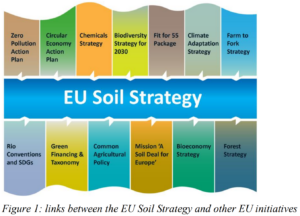EU can plant seeds of change with a strong Soil Monitoring Law
Soil, and the multitude of organisms that live in it, make life on land possible. It provides us with food, with biomass and fibres, and with raw materials. It regulates the water and the carbon and nutrient cycles. Healthy soils are also the largest terrestrial carbon pool on the planet. Coupled with their sponge-like ability to absorb water and reduce the risk of flooding and drought, this makes soil an indispensable ally in climate change mitigation and adaptation.

We are experiencing dramatic degradation of our life-sustaining soil. Currently, around 60 to 70% of soils in the EU are unhealthy. As one of the most undervalued elements of nature, soil is the last unregulated area in EU environmental law. Out of all the environmental directives and regulations of the EU, none focuses directly on soil only – yet.
To solve the key challenges addressed by other EU policies under the European Green Deal, we need laws that protect and restore soil. Ensuring healthy soil will reverse biodiversity loss and protect nature, support a clean and circular economy, and provide healthy food – safeguarding human health.

Image source: https://eur-lex.europa.eu/legal-content/EN/TXT/PDF/?uri=CELEX:52021DC0699
There is fertile ground for soil health to improve in Europe – with the right leadership
A new report by the European Court of Auditors outlines that there is room to improve soil health in Europe. It found that EU standards are frequently unambitious, and that Member States do not target funding towards areas with the most pressing soil problems. Eva Lindström, ECA member in charge of the report, explained that:
“Soil is essential for life and a non-renewable resource. But in Europe, large areas of soil are unhealthy. This should serve as a wake-up call for the EU to roll up its sleeves and bring our soils back to good health. We cannot turn our back on future generations. The upcoming changes to EU rules are an opportunity for EU lawmakers to raise soil standards across Europe.”
How the EU can lay the groundwork for healthy soils
Earlier this month, the EU Commission published its proposal for a Directive on Soil Monitoring and Resilience (Soil Monitoring Law). However, in its current form, it will not enable the achievement of healthy soils in the EU. This is why ECOS, together with a coalition of 40 CSOs, has signed a joint statement, calling on the European Parliament and Council to improve the ambition on:
- A strengthening of the overarching objective
- Legally binding targets
- Focused monitoring on soil biology and land users
- Effective governance with mandatory plans
- Soil pollution prevention and cleaning up
- Binding provisions on land take (area of land ‘taken’ by infrastructure)
- Implementation of the polluters pays principle
- Mobilisation of necessary financial resources
With the conflicts and misinformation surrounding the Nature Restoration Law discussion fresh in everyone’s minds, the Soil Monitoring Law could unfortunately be at risk of experiencing similar resistance. In the debate to come, it will be very important to debunk any myths that arise. We must focus on the development of concrete measures for protecting, restoring, and sustainably using soils – mobilising societal engagement and financial resources, as well as shared knowledge, sustainable practices, and relevant indicators for monitoring.
Building foundations for global action
Of course, soil health is not a localised issue. Legislative soil protection is called for in the plan of action for the conservation and sustainable use of soil biodiversity, adopted at COP15 of the UN Convention on Biodiversity (CBD).
At ECOS, in line with the importance of fostering global action on soil at international level, we are in the process of confirming our accession to ISO TC 190 Soil quality, which is developing two relevant standards:
- ISO/AWI 18718 Assessment of soil functions and related-ecosystem services: definitions and conceptual Framework; and,
- ISO/AWI 18721 Assessment of ecological soil functions: indicators and methods.
Immediate action at global level is necessary to protect and regenerate the living foundation of our ecosystems and societies. The EU can lead the way with its Soil Monitoring Law – but it must not squander the opportunity.

 By
By 
